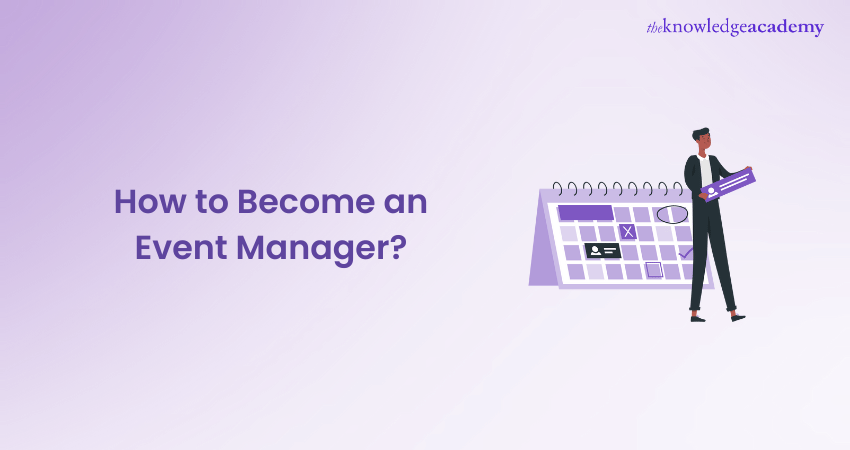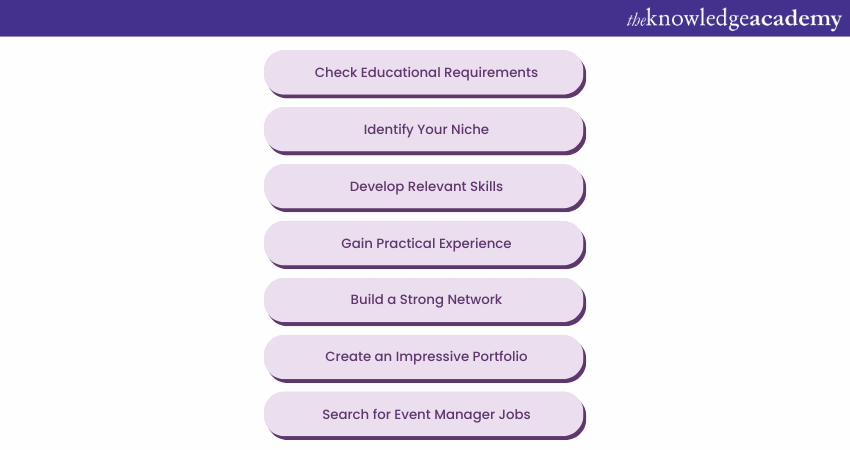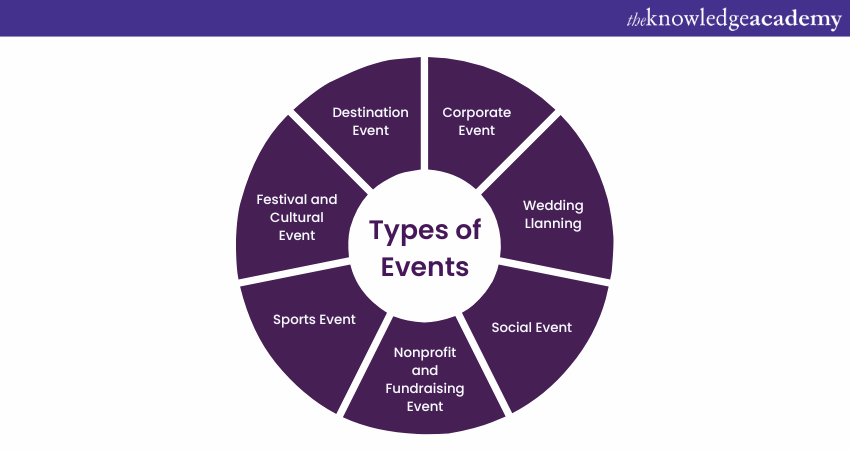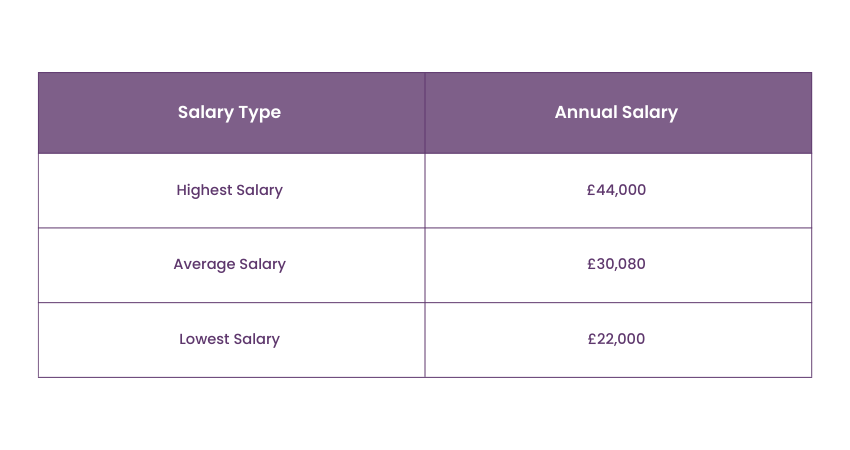We may not have the course you’re looking for. If you enquire or give us a call on 01344203999 and speak to our training experts, we may still be able to help with your training requirements.
Training Outcomes Within Your Budget!
We ensure quality, budget-alignment, and timely delivery by our expert instructors.

Are you drawn to the world of event planning and wondering How to Become an Event Manager? Picture yourself transforming ideas into memorable experiences, whether it's a glamorous wedding or a high-powered corporate conference. Becoming an Event Manager isn’t just about creativity; it’s about mastering organisation, honing essential skills, and building strong networks.
In this blog, we'll take you through each step of How to Become an Event Manager, from understanding educational requirements to landing your first job. Ready to embark on this exciting journey? Let’s dive in and discover what it takes to succeed in Event Management!
Table of Contents
1) What Does an Event Manager Do?
2) How to Become an Event Manager?
a) Check Educational Requirements
b) Identify Your Niche
c) Develop Skillsets
d) Gain Practical Experience
e) Build a Strong Network
f) Create an Impressive Portfolio
g) Search for Event Manager Jobs
3) Salary and Job Outlook for Event Managers
4) Conclusion
What Does an Event Manager Do?
An Event Manager is accountable for planning, coordinating, and executing events such as conferences, weddings, corporate meetings, and festivals. Their role involves selecting venues, managing budgets, coordinating with vendors, and ensuring all logistical details are handled smoothly. They also oversee the event's setup, manage schedules, and troubleshoot any problems that arise during the event.
Additionally, Event Managers are involved in marketing and promoting the event, ensuring that it meets the client’s objectives. Their final objective is to create a seamless and successful experience for attendees, making sure everything runs according to plan.
How to Become an Event Manager?
Embarking on the path to Becoming an Event Manager is an exciting journey filled with creativity and challenges. Here is a step-by-step instructions on How to Become an Event Manager:

Step 1: Check Educational Requirements
Research the educational qualifications needed for Event Management. While a degree isn’t always mandatory, many employers prefer candidates with a background in hospitality, marketing, public relations, or business administration.
Specialised courses or certifications in Event Management can also be beneficial. These programs often cover essential topics like event planning, budgeting, marketing, and logistics, providing a solid foundation for your career.
Step 2: Identify Your Niche

Event Management covers a wide range of events, from weddings and corporate conferences to music festivals and sports events. To identify your niche, consider your interests, strengths, and market demand.
Moreover, research local and global trends in Event Management to see where opportunities lie. Your niche will not only define your career but also influence your branding and marketing strategies down the road. Identifying your niche early on can help you focus your efforts and build expertise in a specific area. For example, if you love music, you might specialise in organising music festivals or concerts.
Step 3: Develop Relevant Skills
In addition to formal education and experience, Event Managers need a specific set of skills to excel in their roles. Here are some crucial skills you should focus on improving:
a) Excellent organisational and time-management skills
b) Strong communication and interpersonal skills
c) Budgeting and financial management abilities
d) Attention to detail and problem-solving skills
e) Creativity and the ability to think on your feet
Unlock your leadership potential with our Management Training – Sign up now!
Step 4: Gain Practical Experience
While education provides a solid foundation, practical experience is equally important. Employers often seek candidates with a proven track record of successfully planning and executing events. Here's how you can start building your experience:
a) Volunteer for Event Planning Roles: Start by volunteering for Event Planning roles. This could involve helping with local community events, assisting with school functions, or working with non-profit organisations. Volunteering not only allows you to learn the ropes but also helps you build a network within the industry.
Volunteering can provide insights into various aspects of Event Planning, including logistics, vendor management, and budgeting. It's an excellent way to test your interest and aptitude for the field.
b) Secure Internships in the Event Industry: Internships are another powerful way to gain valuable experience. Look for internships with Event Planning companies, event venues, or organisations that regularly host events. Internships often provide structured training and mentorship, allowing you to learn from professionals in the field. During your internship, you may be engaged in tasks such as the following:
1) Assisting with event logistics and setup
2) Coordinating with vendors and suppliers
3) Managing guest lists and registrations
4) Handling client communications and expectations
5) Conducting post-event evaluations and feedback collection
Step 5: Build a Strong Network
Networking is an important aspect of any successful Event Manager's career. By connecting with industry professionals, you can acquire information, access job opportunities, and stay updated on industry trends. Here's how to expand your network:
a) Attend Industry Events and Conferences: Try to attend many industry events, conferences, and trade shows to meet professionals and potential clients. These events can also provide useful insights into industry trends and best practices.
b) Join Professional Organisations: You can join professional organisations such as the International Live Events Association (ILEA) or the Meeting Professionals International (MPI). These organisations offer networking opportunities, resources, and educational programs for Event Managers.
c) Network on Social Media Platforms: Utilise social media platforms like LinkedIn and Instagram to connect with professionals in the Event Management industry. Joining relevant groups and participating in discussions and surveys can also help you make your online presence and connect with potential mentors or collaborators.
Step 6: Create an Impressive Portfolio
Developing a strong portfolio is a critical aspect of showcasing Event Manager Skills and establishing yourself as a reputable professional. This is because your portfolio acts as a visual representation of your skills, creativity, and past successes. Thus, it becomes an indispensable tool for attracting clients and potential employers. Here's how to create an impressive Event Management portfolio:
a) Document Your Event Experiences: Compile photographs, event plans, press releases, and testimonials from events you've been involved in. Include a diverse range of projects to demonstrate your versatility as an Event Manager.
b) Showcase Your Creativity: Highlight your creative side by including unique and innovative event concepts or themes you've developed. Use your portfolio as a platform to showcase your ability to think outside the box.
c) Creating a Professional Website: Build a website to showcase your portfolio, highlight your skills, and provide contact information. Ensure that your website is user-friendly and attractive.
d) Social Media Marketing: Use platforms like LinkedIn, Instagram, and Twitter to connect with industry professionals. Further, share your work and stay updated on industry trends. Consistent social media activity can help you build your brand.
Step 7: Search for Event Manager Jobs
After you've acquired the necessary education and practical experience, the next step is to embark on your job search as an aspiring Event Manager. Here are some key strategies to help you secure your first Event Management position:
a) Crafting an Event Manager Resume: Begin by creating a well-structured resume that showcases your skills, education, and relevant experience. Customise your resume for each job application, highlighting the qualifications that match the specific role you're applying for. Also, highlight any internships, volunteer work, or relevant coursework.
b) Preparing for Interviews: Practice your interview skills and be ready to discuss your portfolio in detail. Here, you'll be asked about your experience managing events, your problem-solving abilities, and your interpersonal skills. So, be prepared to provide concrete examples of successful events you've been involved in and how you overcame challenges.
c) Landing Your First Event Project Manager Job: While entry-level Event Management positions may be competitive, consider starting as an Assistant Event Coordinator or Event Planning Assistant. These roles can provide valuable hands-on experience. However, don't be discouraged by temporary or contract positions, as they can act as stepping stones to more permanent roles.
d) Entrepreneurship: If you have a strong entrepreneurial spirit, you may choose to start your Event Management business. This path allows you to have greater control over your projects and potentially earn a higher income.
Learn to price and cost-effectively - elevate your business strategies with our comprehensive Costing and Pricing Training – join now!
Salary and Job Outlook for Event Managers
Understanding the financial and career prospects in Event Management is crucial for those considering or advancing in this dynamic field. Below, we explore the typical salary range for Event Managers and what the future holds for this career path.
Salary for Event Managers
Salary for Event Managers can vary based on experience, location, and the type of events managed.

Source: PayScale
Job Outlook for Event Managers
The job outlook for Event Managers looks positive, with steady demand across various sectors such as corporate events, weddings, and festivals. The industry is expected to continue growing as businesses and individuals increasingly seek professional event planning services. Networking and gaining practical experience are crucial for securing opportunities in this competitive field.
Turn ideas into memorable experiences - join our Event Management Course and become a skilled event planner today!
Conclusion
Embarking on the journey of How to Become an Event Manager is both exciting and rewarding. This blog has provided you with the essential steps, from mastering key skills to building a strong network, that will help you turn your passion into reality. With determination and the guidance you've gained here, you're now well-prepared to create unforgettable events and thrive in your new career as an Event Manager.
Enhance your leadership potential with our Management Courses - develop skills that drive success and growth!
Frequently Asked Questions

An Event Manager should be familiar with tools like Event Management software (e.g., Cvent, Eventbrite) and Project Management apps (e.g., Trello, Asana). They should also know CRM systems, budgeting tools, and social media platforms for promotion.

For successful Event Management, plan meticulously, communicate clearly, stay organised, anticipate challenges, and adapt quickly. Build strong vendor relationships, focus on details, manage your budget wisely, and always prioritise attendee experience.

The Knowledge Academy takes global learning to new heights, offering over 30,000 online courses across 490+ locations in 220 countries. This expansive reach ensures accessibility and convenience for learners worldwide.
Alongside our diverse Online Course Catalogue, encompassing 19 major categories, we go the extra mile by providing a plethora of free educational Online Resources like News updates, Blogs, videos, webinars, and interview questions. Tailoring learning experiences further, professionals can maximise value with customisable Course Bundles of TKA.

The Knowledge Academy’s Knowledge Pass, a prepaid voucher, adds another layer of flexibility, allowing course bookings over a 12-month period. Join us on a journey where education knows no bounds.

The Knowledge Academy offers various Management Courses, including Event Management Course, Costing and Pricing Training, Managing Projects Remotely Training and Certified Manager of Quality Training. These courses cater to different skill levels, providing comprehensive insights into Event Management.
Our Business Skills Blogs cover a range of topics related to Event Management, offering valuable resources, best practices, and industry insights. Whether you are a beginner or looking to advance your Event Management skills, The Knowledge Academy's diverse courses and informative blogs have got you covered.
Upcoming Business Skills Resources Batches & Dates
Date
 Virtual Event Planner Course
Virtual Event Planner Course
Fri 14th Feb 2025
Fri 11th Apr 2025
Fri 13th Jun 2025
Fri 15th Aug 2025
Fri 10th Oct 2025
Fri 12th Dec 2025







 Top Rated Course
Top Rated Course



 If you wish to make any changes to your course, please
If you wish to make any changes to your course, please


